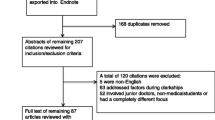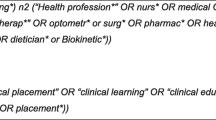Abstract
Objectives
There is a lack of information regarding interventions for undergraduate students at Canadian medical schools who require remediation during their psychiatric training. The need for a theoretical framework to guide remediation has been identified. In this study, we sought to characterize remediation taking place in undergraduate psychiatry education, particularly during clerkship. A secondary goal was to ascertain whether those responsible for remediation were aware of the stages of change (transtheoretical) model, and whether they formally incorporated this framework (or another) into their remediation processes.
Methods
A short six-question survey on remediation practices was e-mailed to educators responsible for undergraduate psychiatry education at all 17 Canadian medical schools as identified through the Canadian Organization of Undergraduate Psychiatry Educators (COUPE).
Results
The response rate was 67 %. Respondents’ overall impressions of their school’s remediation process were that it was “highly effective” (25 %), or “somewhat effective” (67 %); 8 % reported being unsure of its effectiveness. While 75 % of survey respondents were aware of the stages of change model, only 17 % reported using this framework: no alternate theoretical frameworks were reported.
Conclusions
The most common form of evaluation was multiple-choice question (MCQ) exams, and the most common form of remediation was exam rewrites. There is little information regarding the long-term outcomes of remediation, and further research would be useful in formulating recommendations regarding best practices.
Similar content being viewed by others
References
Hauer KE, Ciccone A, Henzel TR, et al. Remediation of the deficiencies of physicians across the continuum from medical school to practice: a thematic review of the literature. Acad Med. 2009;84(12):1822–32.
Hauer K, Teherani A, Irby DM, et al. Approaches to medical student remediation after a comprehensive clinical skills examination. Med Educ. 2008;42(1):104–12.
Torbeck L, Canal D. Remediation practices for surgery residents. Am J Surg. 2009;197(3):397–402.
Kusurkar RA, Croiset G, Mann KV, et al. Have motivation theories guided the development and reform of medical education curricula? A review of the literature. Acad Med. 2012;87(6):735–43.
Prochaska JO, DiClemente CC. Stages and processes of self-change of smoking: toward an integrative model of change. J Consult Clin Psychol. 1983;51(3):390–5.
Hauer K, Carney P, Chang A, Satterfield J. Behavior change counseling curricula for medical trainees: a systematic review. Acad Med. 2012;87(7):956–68.
Teherani A, O’Sullivan P, Lovett M, et al. Categorization of unprofessional behaviours identified during administration of and remediation after a comprehensive clinical performance examination using a validated professionalism framework. Med Teach. 2009;31:1007–12.
Hays RB, Jolly BC, Caldon L, et al. Is insight important? Measuring capacity to change performance. Med Educ. 2002;36(10):965–71.
Davis DA, Mazmanian PE, Fordis M. Accuracy of physician self-assessment compared with observed measures of competence: a systematic review. JAMA. 2006;296(9):1094–102.
Papadakis MA, Loeser H, Healy K. Early detection and evaluation of professionalism deficiencies in medical students: one school’s approach. Acad Med. 2001;76(11):1100–6.
Papadakis MA, Arnold GK, Blank LL, et al. Performance during internal medicine residency training and subsequent disciplinary action by state licensing boards. Ann Intern Med. 2008;148(11):869–76.
Hauer K, Teherani A, Kerr KM, et al. Student performance problems in medical school clinical skills assessments. Acad Med. 2007;82(10):S69–72.
Milan F, Parish S, Reichgott M. A model for educational feedback based on clinical communication skills strategies: beyond the “Feedback Sandwich”. Teach Learn Med. 2006;18(1):42–7.
Cohen M, Ammon A. A solution to the problem of undictated operative reports by residents. Am J Surg. 1998;176(5):475–80.
Dillman DA. Mail and telephone surveys: the total design method. New York: Wiley; 1978.
Zahid MA, Al-Zayed A, Ohaeri J, et al. Introducing the Objective Structured Clinical Examination (OSCE) in the undergraduate psychiatric curriculum: evaluation after 1 year. Acad Psychiatry. 2011;35(6):365–9.
Hodges B, Regehr G, Hanson M, et al. Validation of an objective structured clinical examination in psychiatry. Acad Med. 1998;73(8):910–2.
Levine R, Carlson D, Rosenthal R, et al. Usage of the national board of medical examiners subject test in psychiatry by US and Canadian Clerkships. Acad Psychiatry. 2005;29(1):52–7.
Pell G, Fuller R, Homer M, et al. Is short-term remediation after OSCE failure sustained? A retrospective analysis of the longitudinal attainment of underperforming students in OSCE assessments. Med Teach. 2012;34(2):146–50.
Hays RB. Remediation and re-assessment in undergraduate medical school examinations. Med Teach. 2012;34(2):91–2.
Winston K, van der Vleuten C, Scherpbier A. At-risk medical students: implications of students’ voice for the theory and practice of remediation. Med Educ. 2010;44(10):1038–47.
Winston KA, Van Der Vleuten CP, Scherpbier AJ. The role of the teacher in remediating at-risk medical students. Med Teach. 2012;34(11):e732–42.
Papadakis MA, Paauw DS, Hafferty FW, et al. Perspective: the education community must develop best practices informed by evidence-based research to remediate lapses of professionalism. Acad Med. 2012;(22).
Disclosure
This research was supported by a grant from the Dalhousie University Department of Psychiatry Education Research Fund. One of the authors (CM) was a clerkship director and responded to the questionnaire. There are no other conflicts of interest to declare.
Author information
Authors and Affiliations
Corresponding author
Rights and permissions
About this article
Cite this article
Hazelton, L., Murphy, C. & Lightfoot, K. Remediation Practices in Canadian Psychiatry Clerkships. Acad Psychiatry 38, 350–353 (2014). https://doi.org/10.1007/s40596-014-0099-6
Received:
Accepted:
Published:
Issue Date:
DOI: https://doi.org/10.1007/s40596-014-0099-6




